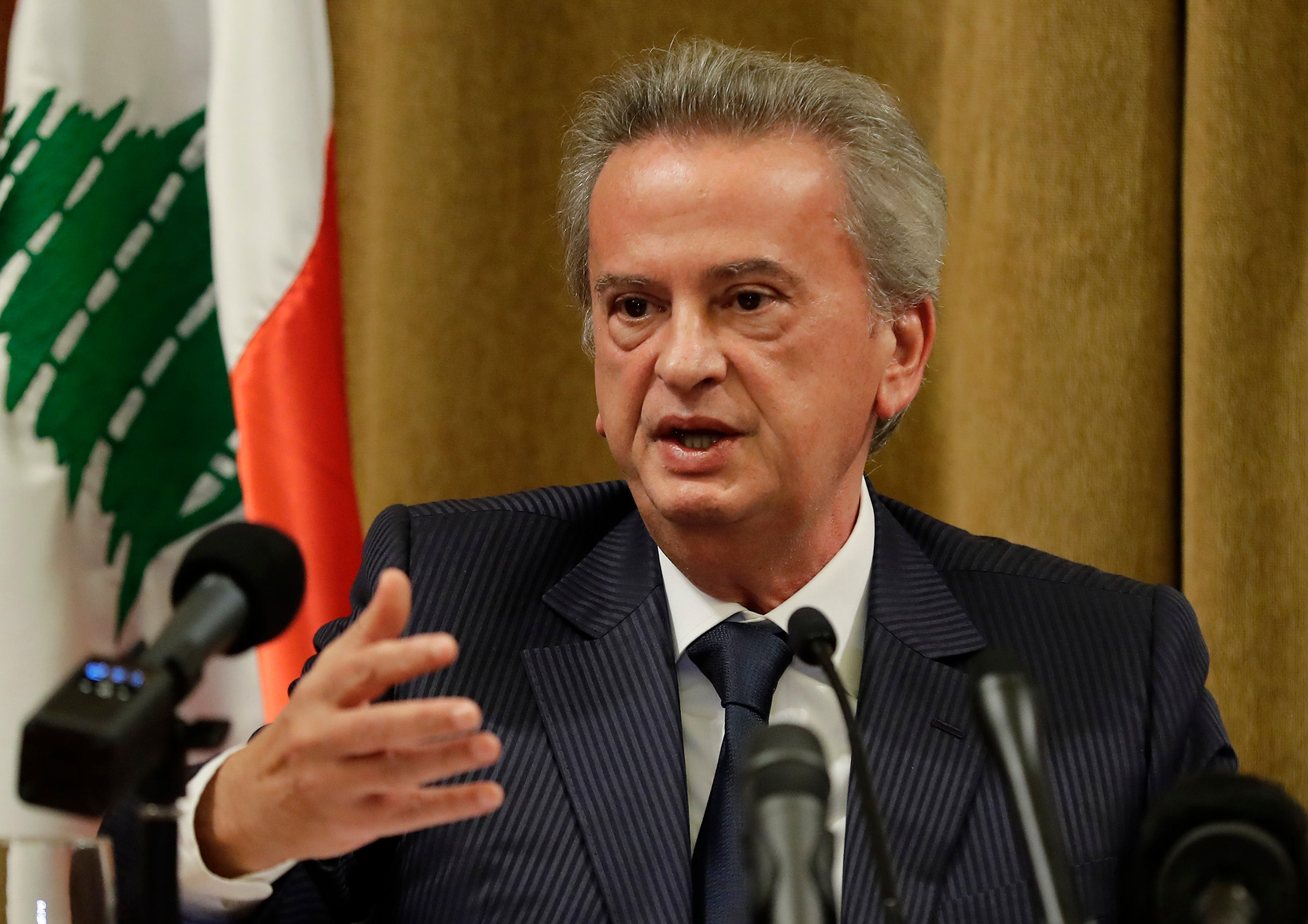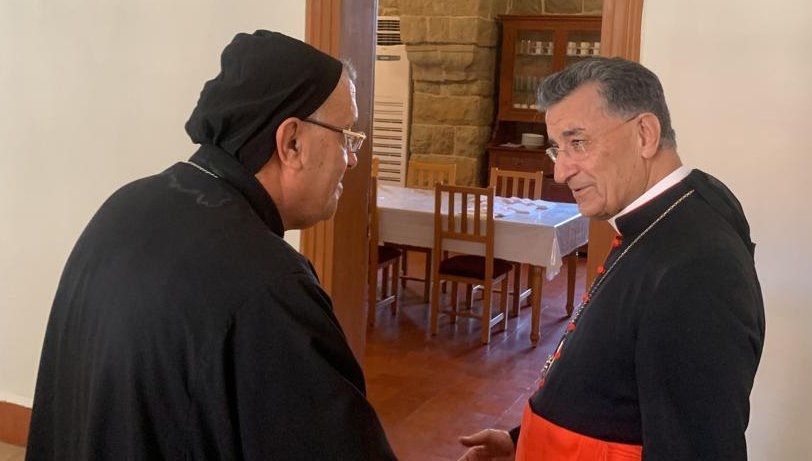by MEE — The government of Saudi Arabia announced on Thursday the expansion of it’s e-visa system to include 12 more countries, making it a total of 19 countries. Under the new system, travellers arriving in Saudi Arabia will no longer require a visa sticker on their passports. Saudi Arabia will now use a printed […]
by cathnews.com — The Maronite Eparchy of Australia has announced the head of the Maronite Church, Cardinal Bechara Boutros Rai, will visit Australia in September. The Patriarch of Antioch and All the East will visit Australia from September 15 to 24 for the celebration of the Maronite Eparchy’s Golden Jubilee Solemn Mass on September 24, […]

by reuters — Lebanon’s longtime central bank governor Riad Salameh defended his record on Wednesday in a televised interview just days before he is set to leave office, denying he embezzled public funds and saying his policies benefited the economy. Salameh, whose 30-year tenure as governor has been stained by a deepening financial crisis and charges at home and abroad of embezzlement of public funds, said he would leave his post when his latest term ends on July 31. “I am going to turn a page of my life,” Salameh, 72, told local broadcaster LBCI in an interview that appeared to take place in a showcase room at the bank. “I believe that during these 30 years, there were 27 of them when the Central Bank contributed with its monetary policies to establishing economic stability and development,” he said, apparently referring to the years preceding the meltdown.
His comments came amid a tug-of-war among top politicians over what to do once he leaves office, with a cabinet session set for tomorrow to discuss a possible successor. Since the economy began to unravel in 2019, the Lebanese pound has lost 98 percent of its value in the parallel market and most of the population has been locked out of their bank savings. The collapse followed decades of corruption and profligate spending by ruling politicians, which many Lebanese say Salameh helped facilitate. Some analysts have described his policy to lend to the government as a “Ponzi scheme.” Salameh said on Wednesday he was being pinned as a “scapegoat” and that his more recent interventions in the money market had helped keep the pound from deteriorating further. “A lot of people were upset that this bank stayed steadfast, and that this bank on its own, because there was no government during this whole crisis, ran the economy,” he said. “We wouldn’t have been able to survive for three or four years… so how is this a Ponzi scheme?”

By Najia Houssari – arabnews.com — BEIRUT: There was anger and grief in the town of Chekka in northern Lebanon on Monday after several dogs were poisoned. One resident, Maurice Boulos, aged 52, was walking his eight-year-old dog Wind one evening when the animal ate some chicken laced with poison that had been left in the street. Wind was dead within half an hour. Boulos said a local vet confirmed the dog died of poisoning. Having discovered the cause, Boulos then rushed to prevent other dogs on the street eating the contaminated chicken. He said he was able to get two to the vet in time to save them, but that several other dogs died.
Police began an investigation after Boulos asked them to check cameras in the vicinity of where the dogs were poisoned. An animal rights activist told Arab News perpetrators of dog poisoning use lannate, which is a banned substance in Lebanon, but readily available. The development comes as authorities in Tripoli investigate the case of a stray dog that rescued an abandoned baby left to die in a trash bag. The dog was seen carrying the bag by a passerby who heard the newborn baby’s cries coming from inside. The bruised infant, who is believed to have only been a few hours old, was taken to hospital for treatment in Tripoli. The scene shook Lebanese public opinion and social media users have hailed the dog as a hero.

by Vanessa Boumelhem — catholicweekly.com — Some of my earliest memories are of Our Lady of Lebanon in Harris Park, where I would attend 9:30am English-language Mass with my family every Sunday, Fersan Al Adra (parish ministry for school aged children which translates to “Knights of Mary”) every Saturday, and visit for a quick prayer every morning before school, where staff and students were predominantly Maronite. Having grown up in this bubble of mine, stepping out of my Maronite world and into the real world was a stark change—one I hadn’t expected, despite all the warnings I received. Going into university, it took only days for me to realise just how much my Maronite identity had made me who I am, and how important it is to me. But what is Maronite identity? I argue that the answer is entirely subjective.
In Australia, I am only one of thousands of Maronites who have each had unique experiences making them into the people they are. It is difficult to define Maronite identity when it is something that runs deep, something our grandparents passed onto our parents—which has now been given to us and will continue to live on. Maronite identity is embedded into the core of each one of us, and is sometimes as simple as the actions we do almost absentmindedly. My Maronite identity is doing the Sign of the Cross before every meal and car ride, or before putting food in the oven. It is deliberately taking longer routes so I can pass by whichever Maronite church is on my way and say a quick prayer as I drive by. It is as simple as saying “esmesalib” (in the name of the Cross) every time I see lightning, or every time something startles me. It is the rosary hanging off the rear-view mirror in my car and the miraculous medal I wear every day. My Maronite identity is knowing that no challenge I face can’t be made easier by a visit to Our Lady of Lebanon, the church I grew up in, which has been a constant in my life from birth until now.

by Nada Homsi — .thenationalnews.com — Armed with bottles of petrol, two depositors held up a bank in Beirut on Thursday, attempting to forcibly recover about $30,000 of their own money. In a rare failure, the two did not manage to recover their savings. It was at least the fourth such bank raid this week as the nationwide phenomenon of angry depositors, desperate to access their own savings, continues. The depositors are often aided and abetted by a network calling themselves the Depositors’ Outcry and a legal coalition called Moutahidoun that in most cases act as the legal council of the depositors. “Depositors should not have to go to the banks and demand their own money,” Alaa Khourchid, president and founder of the Depositors’ Outcry Association that helps people reclaim their savings – often by force – told The National. “But every action has a reaction.”
Inside the planning of a Beirut citizen bank heist
Man recovers $15,000 of savings in Lebanon bank holdup For two decades, Mr Khourchid lived in the West African country of Guinea, working and placing his savings in a Lebanese bank account. But his money became trapped, along with hundreds of thousands of other people’s, in 2019 at the onset of Lebanon’s prolonged and severe financial crisis. With the nation’s foreign reserves severely depleted and dollars scarce, its banks swiftly imposed illegal capital controls to avoid folding – preventing the outflow of money from the country and severely restricting the public’s access to their savings.

By Najia Houssari — arabnews.com — BEIRUT: The brawl that erupted on air Thursday night between a former minister and a journalist sparked widespread condemnation on Friday across Lebanon. The talk show, “Sar El-Wa’et” (It’s About Time) on MTV hosted by Marcel Ghanem, brought together former government minister Wiam Wahab, known for his close ties to Hezbollah and its allies, and journalist Simon Abou Fadel, whose stances are often aligned with the Lebanese Forces party. The dispute began when the discussion turned to US sanctions imposed on Wahab, and escalated when Abou Fadel remarked that “the US disciplines the Lebanese.” Wahab then assaulted Abou Fadel, and Wahab’s bodyguards also intervened. Abou Fadel fell to the ground, being continuously hit until the broadcast was cut off.
Lebanese Armed Forces personnel arrived at the station’s premises to take control of the situation. The broadcast later resumed, and Wahab apologized on air before he was asked to leave by Ghanem. Abou Fadel reappeared with bruises on his face and mouth, and said into a camera: “What happened to me just a while ago is nothing but a part of what has happened to some honorable people who paid the price for their stances.” He then mentioned political figures including the Lebanese Forces party leader, Samir Geagea, “who was imprisoned because of his stances.”

BEIRUT (Lebanon) — By FIBA — One of the best and most exciting players in Asia for the past several years, Lebanon’s Wael Arakji, is poised to make his FIBA Basketball World Cup debut as well as several other veterans. The Cedars’ 1.93m (6’4″) point guard led the country to the FIBA Asia Cup 2022 Final in Jakarta and was named MVP of the tournament. Among his top performances was a 32-point effort against China in the Quarter-Finals. He averaged a team-high 26.0 points per game for the Lebanese.
Arakji is joined by several other leading players from that team: veteran center Ali Haidar, explosive guard Sergio El Darwich and power forward Hayk Gyokchian. Amir Saoud, the 32-year-old shooting guard who missed last summer’s Asia Cup but played at the previous two editions, is in the squad. He featured in eight games in the Asian Qualifiers for the World Cup and excelled in several. He was especially good against other teams that clinched spots in the World Cup. In two games against the Philippines, Saoud averaged 22.0 points per game, and in one of the two games against Jordan, he poured in 24 points. In his one appearance against New Zealand, Saoud erupted for 28 points. In all, he was a solid 19 of 50 (38.0 percent) from behind the arc, and he made 22 of 24 (91.7 percent) of his free-throws.

by Ivan Mehta — TechCrunch — OpenAI just launched custom instructions for ChatGPT users, so they don’t have to write the same instruction prompts to the chatbot every time they interact with it — inputs like “Write the answer under 1,000 words” or “Keep the tone of response formal.” The company said this feature lets you “share anything you’d like ChatGPT to consider in its response.” For example, a teacher can say they are teaching fourth-grade math or a developer can specify the code language they prefer when asking for suggestions. A person can also specify their family size, so ChatGPT can give responses about meals, grocery and vacation planning accordingly. While users can already specify these things while chatting with the bot, custom instructions are helpful if users need to set the same context frequently. The instructions also work with plug-ins, making it easier for them to suggest restaurants or flights based on your location.
OpenAI noted that the feature is available for Plus plan users, but it won’t be available for people based out of the EU and the U.K. It is a beta feature for now. Users can try out this feature on the web by clicking on their name and going to Settings > Beta features > Opt into Custom instructions. On iOS, users can access this through Settings > New Features > Turn on Custom Instructions.
Notably, OpenAI says that the information given to the customize responses will be used to train its API models to adapt to different instructions. “Information from your use of custom instructions will also be used to improve model performance — like teaching the model how to adapt its responses to your instructions without overdoing it,” the company said. However, users can opt out of this setting through their data control settings. OpenAI has been testing this feature with some users for a while now, as consultant Gavriel Cohen noted on Twitter. ChatGPT provides users with two boxes to specify their chat preferences where users can write about themselves and about the way they want to tune the chatbot’s responses.
By Emma W. Thorne, Editor at LinkedIn News — The workers most opposed to returning to the office full-time? Senior-level executives making over $150,000 a year, finds new research from McKinsey. In the sizable survey — which included 13,000 people in six countries — those senior employees say they’d quit if forced to come back […]



